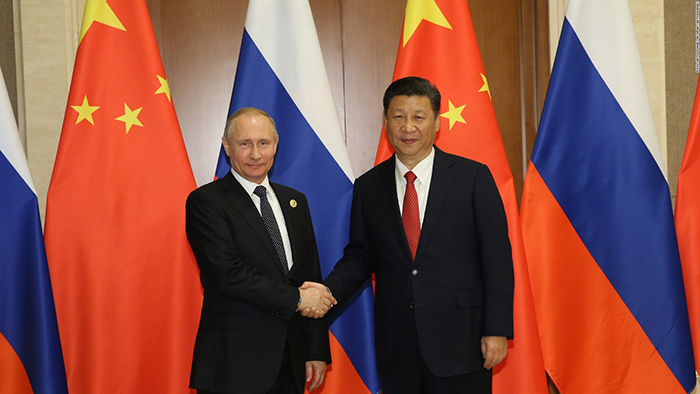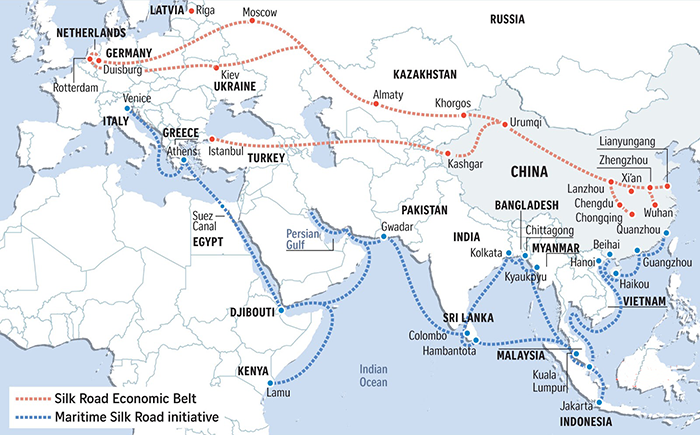One Belt, One Road initiative
Challenges and opportunities
Developing Just LeadershipZia Sarhadi
Ramadan 06, 1438 2017-06-01
News & Analysis
by Zia Sarhadi (News & Analysis, Crescent International Vol. 46, No. 4, Ramadan, 1438)
Representatives from 130 countries, among them 29 heads of State, participated in China’s One Belt and One Road Forum for International Cooperation (OBOR) held in Beijing from May 14–15. In addition to the host President Xi Jinping of China, Russian President Vladimir Putin, Turkish President Recep Tayip Erdogan, and Pakistani Prime Minister Nawaz Sharif as well as presidents of the Central Asian Republics were all there. So was the Greek prime minister. Conspicuously absent was Indian Prime Minister Narendra Modi despite an invitation from China. He sulked in Delhi eating his daal roti lunch alone, as is his habit. Modi had shot himself in the foot. The OBOR initiative will not stop because of his absence or tantrum. Even Indian commentators berated Modi for his absence.
Far from appreciating the transformative impact of the initiative globally, the Western corporate media and its puppets in the Muslim world went into overdrive to spin the initiative in negative terms. From the Qatari regime’s television channel, al-Jazeera, to Britain’s elitist and self-styled leftist newspaper, The Guardian, the talk was all about how China aims to use the OBOR to expand its political clout, branding it a questionable project heavily reliant on debt. As if the US, projected by the same corporate media as the so-called economic engine of the world, is debt free.

The Chinese side of the story was almost completely ignored and unless one actively searched for positive aspects of the OBOR initiative, it was hard to come by, at least in the Western corporate media. China, like all other states, will leverage its economic clout through the OBOR to expand its political influence. This is a common feature of global politics. Nevertheless, it should be mentioned that while China has invested $18.5 billion under OBOR that has led to the creation of 180,000 jobs in several countries, Beijing has not set up military bases in these countries.
This is in stark contrast to Washington, where countries having economic and political ties with the US often end up hosting Washington’s military bases and are forced to become America’s proxies. According to a Globalresearch.ca report from 2016, “…the US Military has bases in 63 countries. Brand new military bases have been built since September 11, 2001 in seven countries. In total, there are 255,065 US military personnel deployed worldwide.”
Nevertheless, with all the negative spin, even the capitalist economic leverages of NATO regimes could not ignore OBOR’s impact. The international business consultancy, McKinsey, reported in 2016 that the OBOR is of historic proportions since it influences 65% of the world’s population.
The OBOR is not just a trade project although President Xi announced investments of nearly $150 billion annually over the next 10 years. This adds up to a $1.5 trillion investment in some 78 countries. In his opening address, President Xi announced an immediate commitment of $124 billion for various projects, almost like a gift to the conference. China has already invested $900 billion in roads, infrastructure, rail, energy, and other projects in Russia and Central Asia. More than $50 billion have been earmarked for the China-Pakistan Economic Corridor. It is all about connectivity.
President Vladimir Putin of Russia also spoke in glowing terms about the OBOR initiative. He stressed Russia’s commitment to working with its regional partners to forge a new “political and economic landscape of the continent and bring peace, stability, prosperity, and a new quality of life to Eurasia… Greater Eurasia is not an abstract geopolitical arrangement but, without exaggeration, a truly civilization-wide project looking toward the future.”
He also had a message for the global community (meaning the US and its NATO allies). Putin said the new initiative must be an example of a collective, innovative, and constructive future based on justice, equality, and respect for national sovereignty, international law, and the unwavering principles of the United Nations. This was directed primarily at the US that acts as a global cop threatening, attacking, and bombing countries whose leaders refuse to surrender to Washington’s whims.

“However, desire and will alone are not enough to follow through on this agenda,” said Putin. “Efficient tools for this type of cooperation are required. These can be created through integration. Today there are many thriving integration projects in Eurasia. We support them and are vested in their further development.”
Beyond economics, there is also a science aspect to the OBOR initiative. According to Science, a magazine that focuses on scientific matters as the name suggests, “…[a] science and technology action plan calls for training 5,000 foreign scientists, engineers, and managers over the next 5 years, as well as welcoming younger scientists to China on short-term research visits [that pledge comes on top of a separate program that each year provides 10,000 scholarships to students from developing countries to study in China]. The initiative also calls for setting up 50 joint laboratories, though the research fields and other details are not yet specified.”
Nevertheless, the OBOR initiative will face strategic challenges in terms of soft power and geopolitics if China does not undertake genuine albeit Chinese-rooted political and ideological reforms that would have global appeal, a feat almost impossible to imagine at present. Chinese soft power appeal is limited. For instance, youth in Kuala Lumpur or Moscow do not want to mimic the Chinese lifestyle, but the one projected by Hollywood.
In fact, even the Chinese elite as well the as up-and-coming youth take pride in affiliation with the Hollywood worldview and lifestyle. China’s adherence to communist ideology and its semi-authoritarian mode of governance make it an easy target for NATO’s negative propaganda. It should be borne in mind that the United States and its Western allies did not attain influence in other societies through tanks and money alone; the sophisticated spin of its liberal economic and political ideas often created willing Trojan horses in many countries that are under Washington’s dominance today.
At the political level, the biggest challenge to OBOR will be how Russia and China manage their interests in Central Asia. Moscow is candid about the fact that it views the countries of the former Soviet Union as its strategic and privileged sphere of influence. For China, Central Asia is a crucial market for its consumer goods and security matters. On security issues, both China and Russia see eye-to-eye. Like Moscow, Beijing too does not want to see the rise of Islamic political movements in the region populated by Turkic people, who would be willing to assist the oppressed Muslims of Xinjiang region that are also ethnic Turks.
The challenge will come when local socio-political players in Central Asia try to play Moscow and Beijing against each other. The Western regimes will certainly encourage this; they are not hiding their disdain for the new Silk Road initiative. The advantage the West has over Beijing and Russia is that due to the unpleasant experience of Soviet rule over the people of Central Asia, by default they view communism, Russia, and China in negative terms. To neutralize this perception Moscow and Beijing must show to the Central Asian people that they are not diehard backers of the regional autocratic regimes, a policy shift unlikely to take place immediately. Beijing can and must learn from the mistakes of the European Union: avoid politicizing the OBOR initiative and focus on economic development.
Regardless of challenges, the OBOR initiative will usher tectonic changes in the global economic and political order.

